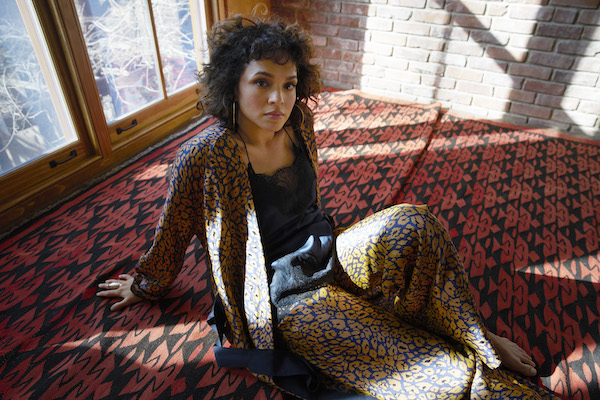Jan 13, 2026 2:09 PM
More Trump-Kennedy Center Cancellations
The fallout from the renaming of the John F. Kennedy Center for the Performing Arts to include President Donald…

During the past 18 years, Norah Jones has collaborated with musicians from a range of different genres.
(Photo: Diane Russo)That confusion has eased, as has her sensitivity to it. “In the beginning it was a weird thing,” she said. “People either liked what I did or they begrudged my success doing it. It became just words. If none of them are true or all of them are true, it doesn’t matter.”
While the new album largely is built around her voice and piano trio featuring jazz stalwarts like bassist John Patitucci and drummer Brian Blade, the environments they create are a varied lot. The album also includes collaborations with Wilco frontman Jeff Tweedy, who brings his own sonic predilections to the mix.
Tweedy is just one of a diverse group of collaborators with whom Jones has connected over the years. She has recorded with gospel legend Mavis Staples, rapper and producer Q-Tip, and country icons Willie Nelson and Dolly Parton. She made an entire album, 2012’s Little Broken Hearts, with pop-electronica wizard Brian “Danger Mouse” Burton.
“She’s not trying to impress 100 students at Berklee,” said Don Was, president of Blue Note Records, to which she has been signed since 2002. “She uses her knowledge subtly to enhance the emotional content of the music. She does something I really admire—annihilate genre.”
Expanding on that sentiment, Blade, whom Jones has known for nearly two decades, said: “She has a voice that speaks to people’s hearts.”
Onstage, her expansiveness has impressed impresarios. In 2016, she joined a select group of artists—among them Muddy Waters and B.B. King—who have led or co-led groups at both the Newport jazz and folk festivals. At the former, she previewed her album Day Breaks, on which she appears with Wayne Shorter, Patitucci and Blade. At the latter, she played with Puss N Boots. She was scheduled to play both festivals again this year.
“I don’t think she’s either folk or jazz,” said George Wein, who founded both festivals and is chairman of the Newport Festivals Foundation. “She’s a great singer. She knows how to tell a story with her singing, and her use of lyrics is perfect.”
The new album is her most substantial piece of work since a change in her recording habits that began to take shape after Day Breaks, in 2016. Spurred by growing family obligations, Jones resolved to move away from the music-business model of recording an album, promoting it, touring behind it and then starting the cycle over again. By 2018, she was in the studio every month or so, laying down one or more tracks and leaving open decisions about their release.
“I had a second kid,” she explained. “I was talking to my husband. He said, ‘You can do anything you want. You have all that freedom.’ I said, ‘You’re right. I can figure out a way to do it and be home and happy.’”
Was confirmed that Jones had a wide berth to produce music when and how she wished. He recalled the conversations he and Jones had leading up to the change in approach: “She said, ‘Let’s get experimental and try something different.’ By stepping out of a routine, she started writing really different songs. The way she chose duet partners and recorded for that situation, it expanded the horizon.”
Was drew a connection between Jones’ change of approach and the disruption caused by the pandemic. “It ties in very much with Norah’s record. When you take all the patterns you’ve formed for being creative and throw them out the window, incredible things happen.”
Lacking, she said, both the inclination to write on a regular schedule and production deadlines to focus her attention, Jones increasingly has found the flexibility of digital voice memos useful in facilitating the creative process: “The past few years, I find myself having little ideas all the time. They’re just fragments, but it’s always the start of something—it could be the start of a whole song.”
Armed with her ideas, an open mind, an abundance of trust in her colleagues and sometimes little else, she has headed into the sessions with a new abandon.
“When I go into the studio with a musician I respect, I’m not worried,” Jones explained. “And that’s a nice feeling. It takes the nervousness out of it. Something will happen. It might not be a pop hit. But I don’t care about that.”

Belá Fleck during an interview with Fredrika Whitfield on CNN.
Jan 13, 2026 2:09 PM
The fallout from the renaming of the John F. Kennedy Center for the Performing Arts to include President Donald…

Peplowski first came to prominence in legacy swing bands, including the final iteration of the Benny Goodman Orchestra, before beginning a solo career in the late 1980s.
Feb 3, 2026 12:10 AM
Ken Peplowski, a clarinetist and tenor saxophonist who straddled the worlds of traditional and modern jazz, died Feb. 2…

The success of Oregon’s first album, 1971’s Music Of Another Present Era, allowed Towner to establish a solo career.
Jan 19, 2026 5:02 PM
Ralph Towner, a guitarist and composer who blended multiple genres, including jazz — and throughout them all remained…

Rico’s Anti-Microbial Instrument Swab
Jan 19, 2026 2:48 PM
With this year’s NAMM Show right around the corner, we can look forward to plenty of new and innovative instruments…

Richie Beirach was particularly renowned for his approach to chromatic harmony, which he used to improvise reharmonizations of originals and standards.
Jan 27, 2026 11:19 AM
Richie Beirach, a pianist and composer who channeled a knowledge of modern classical music into his jazz practice,…